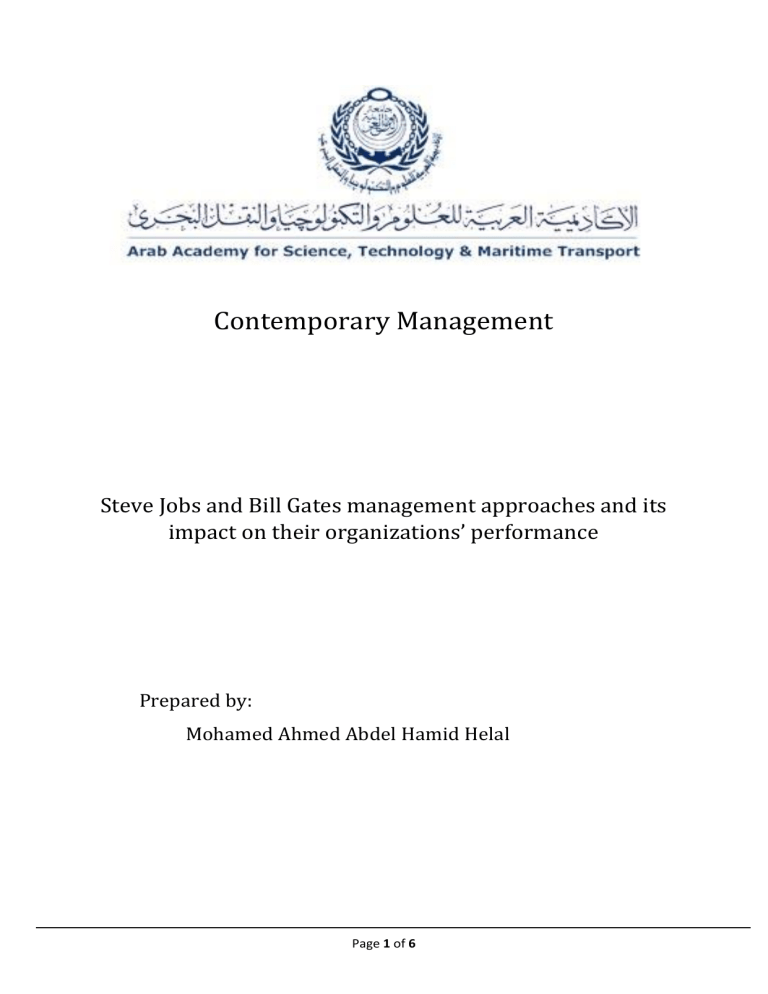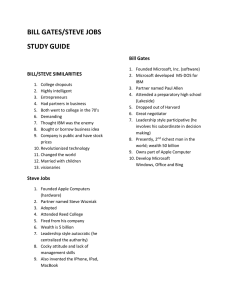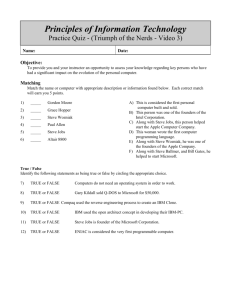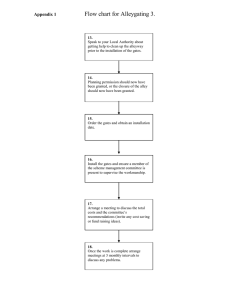
Contemporary Management Steve Jobs and Bill Gates management approaches and its impact on their organizations’ performance Prepared by: Mohamed Ahmed Abdel Hamid Helal Page 1 of 6 In 1955, two of America's most brilliant minds, Steve Jobs and Bill Gates, were born and grew up in different environments which reflected on their leadership skills. However, both are successful business owners and they have a major thing in common, the passion to innovation in the world of computing technology. Steve Jobs was a successful entrepreneur who co-founded Apple Computer. He was born in Wisconsin, and his parents gave him for adoption. He was smart and experimental. Steve’s beginnings were humble pushing him to be self-made. While studying at high school, he was working as a summer employee at the Hewlett-Package Company and in 1974 after dropping out of college, he worked as a video game designer in Atari. In 1970`s, computers were enormous machines that only the largest companies could afford. In 1975, Jobs` friend Steve Wozniak was trying to build a little computer. Jobs became fascinating with marketing it. In 1976, they launched their individual company. They named it Apple Computer Company, in memory of happy summer which Jobs had spent picking apples. Jobs resigned Apple in 1985 and started a new company called NeXT. In the same year, Jobs purchased an animation company which was later named as Pixar Animation Studios. In 1997, Apple brought NeXT for $429 millions. Jobs returned in the same year as Apple CEO. Bill Gates was the chairman and CEO of Microsoft Corporation. He was born and grew up in Washington. He came from an upper-middle-class family. He was very intelligent by nature. Gates studied in Lakeside Private School. He was a hard worker and smart student who excelled in Math and Sciences. In 1973, Bill joined Harvard University as a law student but he found his interest in software programming work. He developed the programming language called Basic for Altair computers. In 1975, he dropped out the collage and co-founded with his childhood friend Paul Allen their own software company Microsoft. Page 2 of 6 In 1980, Gates had his greatest opportunity, when IBM approached him to develop an operating system for its personal computer. In early 1990s, Microsoft had sold more than 100 million copies of MS- DOS. In 1985, Gates became the chairman and chief architect of Microsoft and in 2014, he announced that he would step down the chair of Microsoft so that he can focus on his charity. Bill Gates was driven by numbers, equations, and even economics. His plan was realistic; he thought about the present. For him, it was always about the money and he already gained a pool of profits and became one of the richest men in the world. Microsoft’s philosophy under leadership of Gates was “A computer on every disk in every house, running Microsoft software” which is more concerned about running their own software in every computer. On the other hand, Steve Jobs was driven by studying people and finding out what makes their lives easier. His approach was futuristic; he thought about the future when made his inventions. For him, money was nice, but it was never about only the money. He couldn`t incur much profits and went in debts because of his futuristic inventions. Apple’s philosophy under leadership of Jobs was “Make computer accessible to everyone and make it very easy to use” which was more concerned about making their computers being easy to access and making it as easy as they can for everyone else to use. The management style of both Bill gates and Steve Jobs is unique. They are very good in implementing high-quality ideas, and working on those ideas to convert it into successful products. They decide to take any risks without any tensions and tried very hard to reach their goals. Steve jobs was too aggressive because of his forceful and demanding personality. Aspirations of Jobs were to place Apple at the front position of technology Industry. Modernization and style are the two key words that he used to set the trend in this global world. Page 3 of 6 Bill Gates was a software developer who always trying to develop new software using new technologies, but slowly, he pushed himself into the management role and became a successful manger of his company. He tried to place the company long term goal and to resolve all problems in the business. Steve Jobs offered a more autocratic leadership style. He used to be the main person in the charge of decision making and typically decides based on his ideas without collecting any inputs from his team members. He is considered as one of the biggest risk taking leaders in the world. Even though during his career he made mistakes, Jobs was always the first who learn from them. When he back again as a CEO of Apple, he was a successful leader managed to build a good relationship with his followers and was able to take Apple to great extents. On the contrary, Bill Gates offered a more Democratic leadership style. He believes in the value of input from his employees for overall company success. Through the process of delegation of tasks, Gates was able to develop a company that utilizes the skills of his team members. Gates was not as creative as Steve. He didn't share his passion for developing through his ideas alone. Instead he utilized the ideas and advices of his team to produce some of the biggest technology game changers in the market today. He was a genius in his own way. The organizational structure of Apple under leadership of Steve Jobs was centralized as was in charge of all final tasks, supervisions and decision makings. It had definite impacts on the corporate culture of the company with specific levels of responsibility for employees. The original organizational structure of Microsoft under leadership of Bill Gates was functional. The company started with only 11 positions but later expanded over the years. Gates was the founder and chairman of Microsoft, and founder and the co-chairman of the Bill & Melinda Gates Foundation. Page 4 of 6 Steve Jobs was famously impatient, petulant, and tough while controlling his team. It was his way of preventing what he called “the bozo explosion,” in which managers are so polite that mediocre people feel comfortable sticking around. This rudeness was accompanied by an ability to inspirit and infuse Apple employees with an abiding passion to create groundbreaking products and a belief that they could accomplish what seemed impossible. His top employees were more loyal to him than those at other companies, including ones led by kinder and gentler bosses. CEOs who study Jobs and decide to emulate his roughness without understanding his ability to generate loyalty make a dangerous mistake. Bill Gates created a management system known as “stack ranking” to control and motivate Microsoft employees. This program forces every unit to declare a certain percentage of employees as top performers, good performers, average, and poor. It was a destructive process inside Microsoft and led to employees to focus on competing with each other rather than competing with other companies which Cost Microsoft Its Creativity. Steve Jobs was One of the greatest spokespersons and presenter over all world and Bill Gates also was very good spokesperson even he appeared in a series of ads to promote Microsoft in 2008. Finally, we can say that Steve Jobs and Bill Gates management approaches were on a completely different spectrum, however, both of them offered some of the most successful products ever to the world. The difference between them and other CEO's is that they understood what needs to happen. This is the most important step for any leader, having the ability to recognize what needs to be done and how to execute this in order to become more productive and successful. Page 5 of 6 References: Difference Between.net: “Differences Between Bill Gates and Steve Jobs” http://www.differencebetween.net/technology/differences-between-billgates-and-steve-jobs/ UKESSAYS.com: “Comparing Bill Gates And Steve Jobs” https://www.ukessays.com/essays/commerce/comparing-bill-gates-andsteve-jobs-commerce-essay.php UKESSAYS.com: “Bill Gates And Steve Jobs: Business Leaders” https://www.ukessays.com/essays/business/bill-gates-and-steve-jobstwo-big-business-leaders-business-essay.php DIFFERENCE.WIKI: “Steve Jobs vs. Bill Gates: What's the Difference?” https://www.difference.wiki/steve-jobs-vs-bill-gates/ Inc.com: AJ Agrawal: “Jobs or Gates: Differences in Leadership” https://www.inc.com/aj-agrawal/jobs-or-gates-differences-inleadership.html ALJAZEERA.com: FACE TO FACE: “Steve Jobs and Bill Gates: Inside the rivalry” https://www.aljazeera.com/programmes/face-to-face/2017/07/stevejobs-bill-gates-rivalry-170709084024457.html Harvard Business Review: Walter Isaacson: “The Real Leadership Lessons of Steve Jobs” https://hbr.org/2012/04/the-real-leadership-lessons-of-steve-jobs Apple Steve Jobs Blog http://applesteve.weebly.com/organizational-structure.html Bill Gates Blog https://billgatesanalysis.wordpress.com/organisational-structure/ Forbes: Frederick E. Allen: “The Terrible Management Technique That Cost Microsoft Its Creativity” https://www.forbes.com/sites/frederickallen/2012/07/03/the-terriblemanagement-technique-that-cost-microsoft-its-creativity/#46a297eee03a Page 6 of 6


